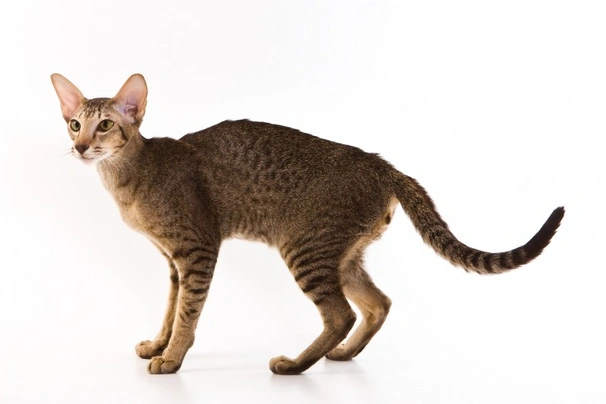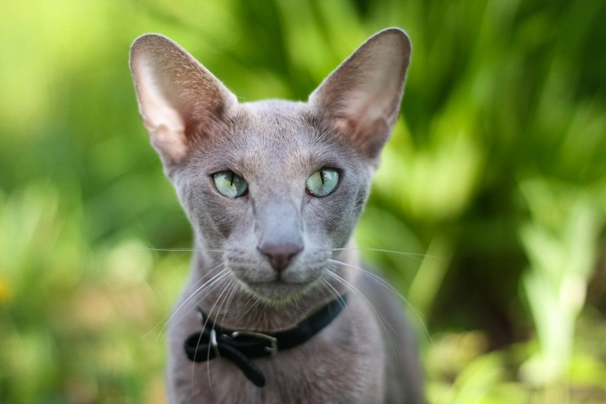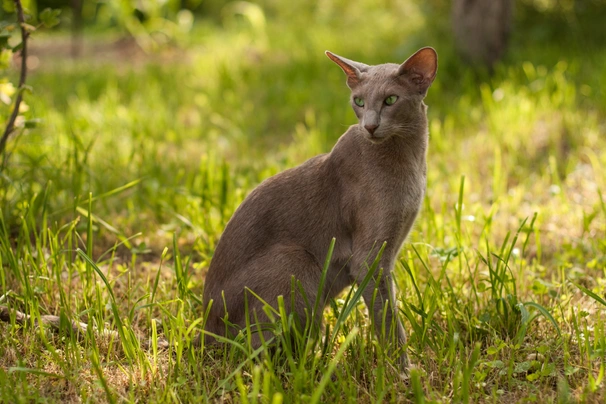Oriental
Introduction of the Oriental
Orientals are very sleek slender cats that boast having a lot of energy. They are talkative by nature and become extremely attached to their owners. They boast wonderful natures and thrive in a family environment and being included in everything that goes on in their environment which is just one of the many reasons why Orientals have consistently remained a popular companion and family pet not only in the UK but elsewhere in the world too.
History of the Oriental
Oriental cats were first bred in the UK during the 1950s with many of the modern breeds we see today having been developed by crossing them with other breeds. One example of these crosses is the Oriental Longhair/Shorthair. Breeds like British Shorthairs Russian Blues and Abyssinians as well as other domestic breeds were crossed with the Siamese but the kittens produced did not have the points and as such they were crossed back to the Siamese with the end goal being for future litters to have the desired coloured points.
In very little time and just a few generations later the cats produced from these crosses looked surprisingly like the Siamese with the only real difference being in the number of colours they came in. As such non-pointed cats are indeed the ancestors of the modern Orientals we see today. At first every colour was named as a unique breed in its own right which included the Havana the Oriental Spotted Tabby and the Foreign White. However there were just too many colour variations and as such all non-pointed cats were classed as a single breed. Today Orientals are among the most popular cats in the world thanks to their charming looks their devoted friendly and fun-loving natures.
Appearance of the Oriental
Orientals are extremely elegant well balanced cats that boast having svelte bodies and an intelligent alert expression about them. Their heads are shaped like an equilateral triangle being nicely in proportion to the rest of a cat’s body. There is a good width between a cat's ears that narrows in near perfect lines to a finely chiselled muzzle. Seen in profile they have straight noses without any sign of a dip or stop. Chins are strong with cats having level bites.
They have large pricked ears that are wider at the base being set neither too high or too low so they don't interrupt the perfect triangular shape of their head. An Oriental has beautiful eyes that slant nicely towards the nose and which have a good space between them. Their eye colour can be anything from brilliant blue in the Foreign Whites right through to a gorgeous green in other colour variations. Necks are slender and graceful adding to a cat's elegant graceful appearance.
The Oriental has a medium size body that's svelte long and extremely firm with a tight abdomen. Their legs are slim long firm and well-muscled with their back ones being higher than their front legs. A cat's paws are small in size and oval-shaped and they have long tapering tails.
When it comes to their coat Orientals boast having extremely short fine hair that's glossy and close-lying or they can have medium to longish coats which are soft and silky to the touch. They come in a vast array of colours which includes the following:
- Oriental Selfs - solid single colour namely white black havana lilac cinnamon fawn caramel red cream and apricot
- Torties Smokes and Shaded - an array of different colours
- Tabbies - classic spotted ticked and mackerel
- Oriental Bicolour - an array of colours with white in their coat
Temperament of the Oriental
Like a lot of other breeds Orientals like a routine in their lives and don’t particularly like it when anything changes for any reason. They like to be fed at the same time of the day and don't appreciate it when things get moved around the home. Much like their Siamese cousins Orientals are intelligent talkative and extremely sociable cats that thrive on human company. They are very dog-like in many of their behaviours and will follow owners from room to room just to be with them and to see what they are doing.
They are extremely active by nature and enjoy playing interactive games although they are also very good at amusing themselves for hours too. They are known to remain very kitten-like well into their senior years and enjoy being able to climb up high so they can look down on the world below. They are inquisitive and like to investigate every nook and cranny around a home or out in a garden if they are allowed to roam around outside.
As previously mentioned Orientals are exceptionally talkative and like to be included in everything that goes on around them. They may be elegant and graceful to look at but there is nothing fragile about an Oriental because they are more than capable of holding their own when the need arises. They are best suited to households where there's another pet because they don't do so well when living on their own. They adore being at the centre of attention and playing interactive games. They thrive in homes where at least one person stays at home when everyone else is out of the house but are just as happy to be on their own as long as it’s not for too long. They are definitely not a good choice for anyone who prefers to lead a quieter life but are an ideal choice for someone who would like to share their home with an energetic intelligent feline companion.
Intelligence / Trainability of the Oriental
Like their Siamese cousins Orientals are highly intelligent and can be taught to do all sorts of things. They adore interacting with their owners and enjoy playing fetch much like their canine counterparts. Because they are so smart Orientals need to be kept busy when they are not napping that is. As such if kept as an indoor pet an Oriental has to be given lots of things to do which includes having high platforms they can jump up to when they mood takes them as well as lots of cosy corners where they can take a nap which they love doing during the day.
It's really important to invest in good quality toys for an Oriental to play with and to provide lots of scratching posts so they can stretch their legs and which also help keeps cats keep their claws in good condition. If an Oriental does not have enough to keep their minds occupied boredom quickly sets in which could lead to a cat becoming stressed out and unhappy. This in turn could lead to them becoming destructive around the house which is their way of relieving any stress they may be feeling.
Children and other
Orientals with their outgoing playful and affectionate personalities are the perfect choice for families with children and this includes toddlers. They are quick on their feet and therefore know when to get out of the reach of smaller children when they get too boisterous or loud. However care has to be taken when very young children are around cats and any interaction should always be well supervised to make sure things stay nice and calm. With this said children need to be taught how to behave around cats and when it's time to leave them alone.
They also get on well with dogs as long as they have grown up together in the same household. However care has to be taken when introducing an Oriental to dogs they don't already know just in case the dog does not get on with their feline counterparts. They are incredibly social by nature and have been known to get on with pet birds and some smaller animals. However it's always wiser to keep a close eye on any cat when they are around small pets just in case their natural prey drive gets the better of them.
Health of the Oriental
The average life expectancy of an Oriental is between 12 and 15 years when properly cared for and fed an appropriate good quality diet to suit their ages.
Orientals are known to suffer from a few hereditary health issues which are worth knowing about if you are planning share your home with one of these fun-loving intelligent cats. The conditions that seem to affect the breed the most include the following:
- Flat chested kitten syndrome
- Progressive retinal atrophy - breeders should have stud cats eye tested
- Hepatic amyloidosis
- Familial amyloidosis
- Pica
Caring for the Oriental
Orientals need to be groomed on a regular basis to make sure their coats and skin are kept in top condition. On top of this cats need to be fed good quality food that meets all their nutritional needs throughout their lives which is especially true of kittens and older cats.
Grooming of the Oriental
Orientals can have short close lying coats or long coats. A shorter haired cat would need less in the way of grooming than their longer haired counterparts. The good news is that because Oriental Longhair cats have silky fine hair that does not tangle or knot as easily as other breeds they are still quite low maintenance on the grooming front. A twice weekly brush is all it takes to keep their coats looking good. Shorter hair Orientals just need a weekly once over to remove any loose or dead hair from their coats and a weekly wipe with a chamois leather will keep a nice sheen on it too. Like other breeds they tend to shed the most in the Spring and then again in the Autumn when more frequent brushing is usually necessary to keep on top of things.
It's also important to check a cat's ears on a regular basis and to clean them when necessary. If too much wax is allowed to build up it can lead to a painful infection which can be hard to clear up. In short prevention is often easier than cure with ear infections. Cats often suffer from ear mites which can be a real problem which is why it's so important to check their ears on a regular basis.
Exercise of the Oriental
Orientals are high energy cats and need to be given lots of things to do when they aren’t napping so that boredom does not set in. If they are allowed to go outside and it is safe for them to do so an Oriental will spend a lot of their time exploring their environment hunting prey and marking their territory on a daily basis which is something all cats like to do.
Cats kept as indoor pets need to be given lots of things to do and places to hide bearing in mind that Orientals love to climb up high. In short it's a good idea to build a few high platforms around the house for a cat to use when the mood takes them. They also need to have lots of places they can snuggle up for a snooze because if there is one thing cats really enjoy it's taking a nap or two during the day.
Feeding of the Oriental
If you get an Oriental kitten from a breeder they would give you a feeding schedule and it's important to stick to the same routine feeding the same kitten food to avoid any tummy upsets. You can change a kitten's diet but this needs to be done very gradually always making sure they don't develop any digestive upsets and if they do it's best to put them back on their original diet and to discuss things with the vet before attempting to change it again.
Older cats are not known to be fussy eaters but this does not mean they can be given a lower quality diet. It's best to feed a mature cat several times a day making sure it's good quality food that meets all their nutritional requirements which is especially important as cats get older. It's also essential to keep an eye on a cat's weight because if they start to put on too much it can have a serious impact on their overall health and wellbeing. Like all other breeds Orientals need access to fresh clean water at all times.
Oriental price
If you are looking to buy an Oriental you would need to pay upwards of £300 for a well-bred pedigree kitten. The cost of insuring a male 3-year-old Oriental in northern England would be £15.66 a month for basic cover but for a lifetime policy this would set you back £29.47 a month (quote as of September 2016). When insurance companies calculate a pet's premium they factor in several things which includes where you live in the UK a cat's age and whether or not they have been neutered or spayed among other things.
When it comes to food costs you need to buy the best quality food whether wet or dry making sure it suits the different stages of a cat’s life. This would set you back between £15 - £20 a month. On top of all of this you need to factor in veterinary costs if you want to share your home with an Oriental and this includes their initial vaccinations their annual boosters the cost of neutering or spaying a cat when the time is right and their yearly health checks all of which quickly adds up to over £600 a year.
As a rough guide the average cost to keep and care for an Oriental would be between £40 to £60 a month depending on the level of insurance cover you opt to buy for your cat but this does not include the initial cost of buying a well-bred kitten.

FREE MUM with 2 babies
£50
Two beautiful oriental fur babies
£595


